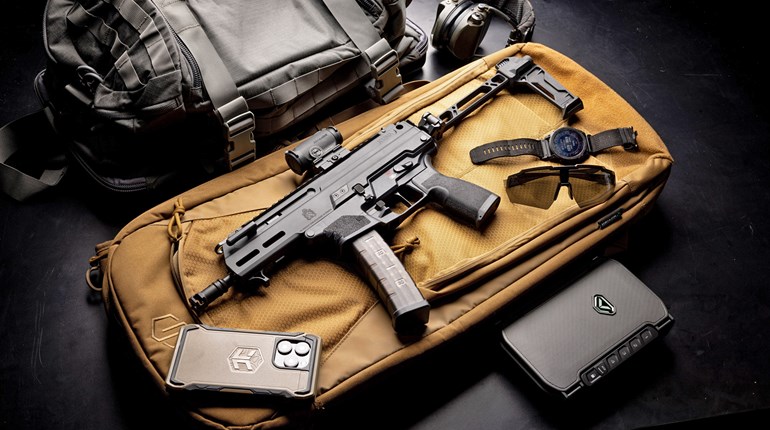
Consider, if you will, these two very different home invasions.
A woman is home alone when a strange man enters her house. She immediately runs to the bedroom and retrieves her shotgun. At this point, she positions herself strategically, using the door frame and wall for cover and looking down the hallway through which the intruder must travel to get to her. In addition, a strategically placed hall mirror allows her to keep tabs on most of the suspect’s movements.
At some point during the invasion, the suspect turned a corner and started down the hallway toward the lady’s location. At that point, what he saw was the twin muzzles of a Mossberg Maverick defensive shotgun. Accompanying that strong visual experience were the clear and concise instructions, ”Get Out!”
Using what was probably the best judgment in this crook’s entire life, he fled.
In the second home invasion, a man is at home when a suspect enters his house. Grabbing his gun, the homeowner yells for the suspect to leave. In this case, as in the first, the suspect utilizes exceptionally good judgment and beats feet.
Unfortunately, the homeowner decides to give chase. He pursues the home invader off of his property and quite a ways down the street, whereupon, the crook pulls out a firearm and shoots the homeowner.
It is very likely that the outcomes of these two home invasions were the result of having a defensive plan and the lack of a defensive plan. Taking the time to consider what might happen and how to deal with it is an important part of personal defense. Waiting until the actual event is taking place, with all of the stress that accompanies it, is really a recipe for acting with poor judgment, or no judgment at all. Being in panic mode or full of rage will often cause a person to do things that are extremely ill-advised.
It has been said that a plan, any plan, will not survive the first contact with the enemy. And, since there are so many variables in play, that could be true. We really don’t know what the criminal’s level of expertise is. We may not have any idea of his (or her) level of sobriety or judgment. And we don’t know how well the aggressor has thought out their own plan, assuming they have considered such things at all. Not only are these things that we don’t know, but we also don’t have any control over them. We can, however, control our own response.
Having a personal-defense plan gives us a foundation for dealing with a threat. The scenario will very likely not go completely as we have envisioned. But, having a plan gives us a place to start. It also gives us confidence to modify the plan as the situation unfolds.
In the first situation, I know this woman had obtained defensive firearms training and engaged in continual practice. I also know that she had discussed ways to deal with criminal attacks with her instructors and knowledgeable friends. She was smart enough to ensconce herself in a defensible position that forced the criminal to come to her. And she had chosen a shotgun as a home-defense tool. All of these things indicate this lady had developed a personal-defense plan and was staying as calm as the situation would permit.
In the second scenario, my guess would be that man did not have a personal-defense plan and, at some point in the encounter, allowed rage to take over. He was in pretty good shape until he decided to give chase to the suspect. Chasing a suspect is the job of law enforcement. The only exception I can think of would be if the fleeing suspect had one of your children under his arm. Deadly force is generally only permissible when a serious threat is in our face and there is no good way to get away from it. Once that threat is removed, even if it means that the suspect will get away, the armed citizen is wise to stand down.
Developing a personal-defense plan involves getting as much good training as possible. It involves running possible scenarios through your mind and working on solutions to those problems. Part of the plan also involves getting expert advice from law enforcement officers and attorneys. All of these things should be done before a person ever has to point a gun at another person. Trying to think and function in the middle of an attack is tough enough even when one has given it some prior thought and consideration.
Some may be a bit tired of the fact that I keep emphasizing the importance of the personal-defense plan. But, in truth, it can make all the difference in the world as to whether or not a person will survive a violent criminal attack. And a strong defensive plan may, as in the case of this woman, mean that no shots have to be fired and no one gets hurt.
A strong personal-defense plan may be all the difference in the world between your saying, “They told me this could happen and I know just what to do about it,” as opposed to, “Good grief! What the hell do I do now?” Which will it be when the time comes?

































